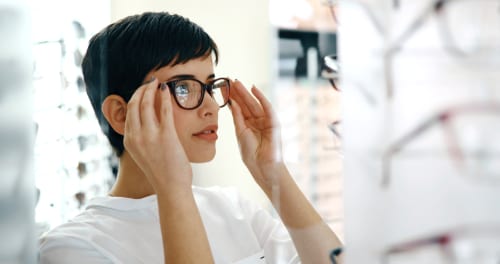Your vision can change over time due to aging, pollution, stress, genetics and improper eye care. Maybe you have not experienced vision problems prior, but now you are wondering why you see double or blurry images. If you start experiencing any of those sight-related issues, it might be time for your eyes to be checked with an ophthalmologist.
Wearing corrective eyewear can be cool especially with the different styles to choose from. Check out firmoo.com for the different frames to choose from.

Here are some symptoms you might need eyeglasses:
Vision Quality
If your vision doesn’t have the same quality that it used to, then you might need to wear glasses. Symptoms include:
- Blurry vision
It can be a sign of vision problem, when you’re reading or looking at objects from a distance and you realize the objects are not clear anymore as before. Kids may notice this when doing homework or reading. Adults may experience this when driving, reading or when in front of the computer.
- Squinting frequently
You might find yourself squinting to get clearer vision. Squinting is a temporary fix to reduce excess light entering your eyes and improve a blurry image. It is also a sign that you are trying to compensate your difficulty in seeing. It is a symptom of nearsightedness or problem seeing far objects, or farsightedness or trouble seeing objects close to you.
- Halos
Circles or halos around car headlights, light bulbs or any light source are a symptom that your eyes have difficulty in focusing. This symptom is also a sign of cataract, but sometimes, it can be fixed by using glasses, so it’s essential to have the eyes checked with an expert.
Physical Problems
If your eyes are hurt, you might need to use glasses as a means to alleviate the stress experienced by your eyes. Problems include:
- Eye strain or pain
Eye pain can be caused by different factors including allergies, cold, flu, improper eye care or not getting enough sleep. However, if the pain does not go away after a week and you experience pain when moving your eyes, or your eyes feel tired after normal activities like light reading or watching TV, then you might need eye assistance. Have your eyes checked to ensure that you don’t have an unknown health condition, eye infection or vision changes. Take care of your eyes to prevent vision loss.
- Frequent headaches
Frequent headaches are one of the symptoms of a vision problem. When your eyes work hard to focus better, it can lead to headaches. Headaches are usually linked to farsightedness, also known as astigmatism. This condition causes difficulty in seeing both far and close objects.
- Frequent eye rubbing
Eye rubbing is a sign of eye strain or eye fatigue. Glasses can sometimes help reduce tiredness of the eyes by giving it the ability to focus light better. Sometimes, however, rubbing the eyes due to itch can be brought about by allergic conjunctivitis, a medical condition also known as pink eye. Conjunctivitis is caused by allergies or a bacterial or viral infection. To be sure what causes your frequent eye rubbing, seek the help of an eye care expert.
Difficulty in Seeing
If you can’t see things as well as before, you might need to have your eyes checked by an optometrist. Here are some of the signs that you need glasses:
- Holding books too close or too far
The way you look at objects you are carrying can help tell if you need to have your eyes checked. Reading a book at arm’s length is an indication of farsightedness while holding it too close is a sign of nearsightedness. Many people experience changes in vision as they age, starting at around 40 years of age. Reading glasses can help correct this problem.
- Sitting too close to the TV
When you or your child needs to sit close to the TV just to see clearly, it is a possible sign of nearsightedness. It means that you compensate your inability to see from afar by moving closer to the object you want to look at.
- Covering one eye while reading or watching TV
When covering or closing one eye when watching or reading, it can be a sign that you are covering the defective eye so that it doesn’t get in the way of your activity. This can be a symptom of various vision problems including astigmatism, lazy eye, cataract or double vision brought about by strabismus.
- Inability to see at night or in dim lighting conditions
Difficulty focusing in dark conditions is experienced even with people with perfect eyesight. However, when you really can’t see anything in dim conditions, it can be a sign of vision issues. Wearing glasses may help resolve vision problems like this.
Final Thoughts
If you experience most of these symptoms of vision problems, it may be time to take a trip to an eye specialist. Many people neglect these symptoms and avoid going to the doctor only to find out that their condition could have been treated earlier. Vision correction glasses are more effective if diagnosed early, so it’s beneficial to have your eyes checked for problems right away.







